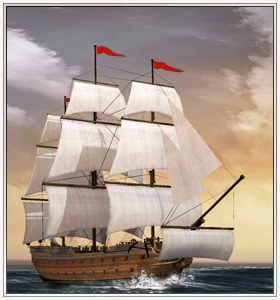Fifth Rate (ETW Unit)
 Frigates are single-deck warships, used for a variety of tasks thanks to a combination of good handling, firepower and endurance at sea.
Frigates are single-deck warships, used for a variety of tasks thanks to a combination of good handling, firepower and endurance at sea.
Overview
“Fifth rate” is a Royal Navy term for the largest of the single-deck frigates, square-rigged ships that carry some 44 guns, usually no heavier than 12-pounders. Originally a French design – but quickly adopted by the other European powers – the frigate is used for pursuit, convoy protection, commerce raiding and reconnaissance work. The design’s excellent sailing characteristics and good handling, especially in inshore waters, make it a useful addition to any blockading fleet. The frigate’s ability to operate far away from a home port also makes it a useful cruiser, carrying the fight to the enemy in unexpected waters.
Frigates can have the advantage over larger, two-deck ships in rough waters. A frigate captain rarely has to worry about his gun deck taking on water, and can therefore fight in conditions that leave bigger ships at a disadvantage. However, fifth rates are not powerful enough to face battleships. They have the speed and handling to stay out of trouble; they do not have the strength of construction to survive a pounding! Against sloops, brigs and merchantmen, however, they are deadly. This makes them excellent postings for officers hungry for prize money and glory.
Frigates captains made splendid role models for fictional heroes: Thomas, Lord Cochrane earned a fortune in prize money, gained the nickname “le loup des mers” (sea-wolf) and was the inspiration for fictional heroes Horatio Hornblower and Jack Aubrey.
Details
Fifth rates are the first of the double-deck ships (although historically they were single deck ships). Nevertheless, they are very speedy, and can outmaneuver all but the lightest and smallest ships. Fifth-rates are well-suited to hunting down trading fleets and are perfect for fighting lighter ships such as galleys. In a battle with heavier warships, fifth rates are useful for chasing down routing ships. With enough management, fifth rates can even take on heavier ships, especially if said ships had first been immobilized or slowed down through chain shot. However, in a direct engagement against heavier ships, fifth rates are very fragile and tend to rout or sink within a few broadsides.
Fifth rates possess chasers (cannon located at the fore of a ship), allowing them to still harry fleeing targets; however, almost all of their guns are located on their sides, so relying on chasers is not usually a smart move.
Fifth rates (including Admirals Flagships) are the largest ship that has 500 range as opposed to 400. This allows Fifth rates to stay out of range and bombard the larger slower ships from a safe distance, but they must remain careful when doing so.
Factions
 Great Britain
Great Britain United Provinces
United Provinces Afghanistan
Afghanistan Austria
Austria Bavaria
Bavaria Dagestan
Dagestan Gran Colombia
Gran Colombia Courland
Courland Denmark
Denmark France
France Genoa
Genoa Georgia
Georgia Greece
Greece Hannover
Hannover Hessen
Hessen Hungary
Hungary Ireland
Ireland Louisiana
Louisiana Mamelukes
Mamelukes Maratha Confederacy
Maratha Confederacy Mexico
Mexico Mughal Empire
Mughal Empire Mysore
Mysore Naples & Sicily
Naples & Sicily New Spain
New Spain Norway
Norway Ottoman Empire
Ottoman Empire Italian States
Italian States Savoy
Savoy Poland-Lithuania
Poland-Lithuania Portugal
Portugal Prussia
Prussia Punjab
Punjab Quebec
Quebec Russia
Russia Persia
Persia Saxony
Saxony Scotland
Scotland Spain
Spain Sweden
Sweden Thirteen Colonies
Thirteen Colonies United States
United States Venice
Venice Westphalia
Westphalia Württemberg
Württemberg
